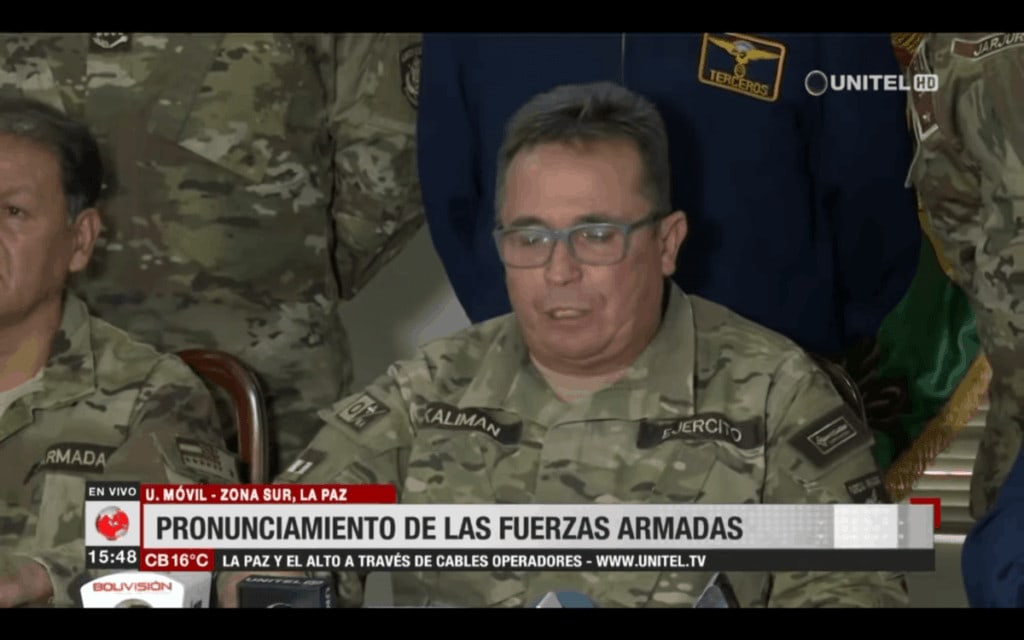In the wake of the Venezuela failure, Bolivia did it right

The ouster of Bolivia’s pro-Iran narco-regime looks like a textbook case of how to execute a popular revolution the right way. This is a huge contrast to the failed attempt to oust the Maduro regime in Venezuela earlier this year.
So far, things have gone as well as the removal of an illegal regime possibly could. Evo Morales, the coca-growing president who aligned his conservative country with Cuba, Venezuela, and Iran, held on to power beyond his constitutional limits and was shown the door.
Bolivia’s civil, police, and military forces didn’t need the flawed advice from Washington that kept Morales’ ally, Nicolas Maduro, in power in Venezuela. (See our January 23 piece, “Steps Venezuela’s Interim Government Must Take – Quickly – to Survive,” which outlined how to mobilize crowds to overwhelm security forces.)
Internal strife had been mounting for weeks after an October 20 election that Morales won through illegal means. The Organization of American States (OAS) issued a bland Sunday morning statement on November 10, finding a “heap of observed irregularities” in the process. That statement set off Bolivia’s primed powder keg.
Morales’ government chiefs quit their posts.
“After analyzing the situation of internal conflict, we ask the president to resign, allowing peace to be restored and stability to be maintained for the good of our Bolivia,” announced General William Kaliman, chief of the Bolivian military.
“Large crowds formed in the main squares in the capital, with many people rejoicing and some crying tears of joy. Protesters lay down in front of the presidential palace and set a coffin on fire to symbolize the death of the Morales government,” the Associated Press reported from La Paz.
Here’s how Bolivia did it right
Bolivians from all walks of life joined together to pull off a textbook-perfect ouster of an illegal regime. Though the details have yet to emerge, the clumsy hand of Washington was nowhere to be seen. This writer knows that Edward Luttwak’s classic Coup d’Etat: A Practical Handbook has been required reading for decades in the Bolivian army.
This was a big win for Bolivia. A big win for the Monroe Doctrine. A big win for American national interests. And a big win for President Trump’s National Security Strategy that stresses the promotion of national sovereignty.
Here’s how Bolivia did it right:
1. First, it wasn’t a coup d’etat. It was a popular revolution with widespread support. The civil opposition, from students, bus drivers, and business leaders in the cities to farmers in the countryside, worked together for a mass-based people’s power movement, with the army and police ensuring law and order.
2. Opposition leaders built and maintained international support across the Americas, with moral backing from Canada, the US, and much of Latin America, and weak but important reinforcement from the Organization of American States (OAS).
2. The united opposition was not intimidated by arrests and persecution of leaders and activists.
3. The civil opposition staged large, popular protests across the country, and had their eyes on disrupting the regime’s instruments of force if necessary.
4. The military and police remained loyal to the Constitution and supported the people.
5. Bolivians kept the world informed on social media in Spanish, English, Portuguese, and other language.
6. Activists physically and electronically monitored the movements of regime leaders.
7. After the protests built to a critical mass and the OAS issued a mild statement about the election fraud, the commander of the Bolivian armed forces went on TV with the commanders of all the military services, and gently suggested that it was time for Morales to resign.
8. The police and armed forces went on full alert to support the public.
9. Morales and his vice president hurriedly resigned.
10. Authorities prevented Morales from fleeing in the presidential aircraft and reportedly issued a warrant for his arrest.
11. Authorities and civic activists began rounding up regime elements.
12. Police and military took control of all airports and border crossings to prevent regime elements from escaping.
13. Morales loyalists are burning and looting, doing the typical things that one would expect from deposed Marxists. All good reason for the security forces and armed citizens to hit back hard.
So far, so good in Bolivia.
The United States apparently played no significant role. (There’s nobody in the State Department or CIA with the constitution or skill set to pull off such a thing.)
Now – contrast this with the mess last winter in Venezuela, when the US backed a fake opposition candidate in a slow-motion campaign to try to convince Venezuelan regime leaders to quit. There was no strategy to use “people power” to overrun the security forces. So Maduro remains in power in Venezuela. But Morales is gone in Bolivia.
- I infiltrated radical groups 40 years ago. Leftists are desperate for martyrs - February 6, 2026
- Chinese spies ‘sham marriage’ scandal exposes ‘targeted’ national security threat at major US base: Waller - January 27, 2026
- The “Donroe Doctrine” In Action - January 7, 2026
